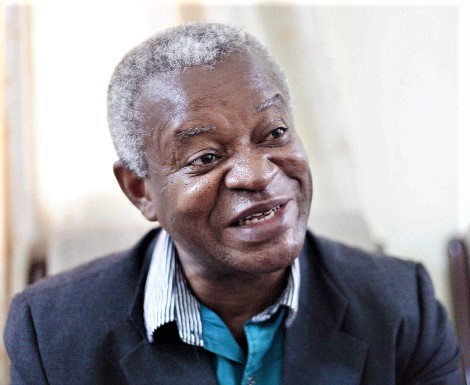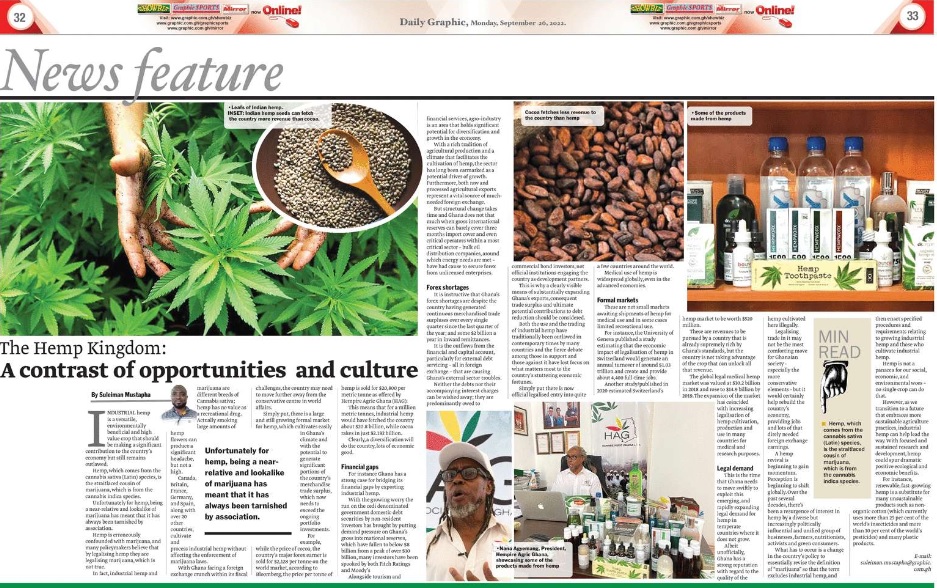A former Chief Executive Officer of the Mental Health Authority (MHA), Professor Akwasi Osei has urged the government to hasten slowly on the legal cultivation of cannabis in large quantities.
To him, if care is not taken, people will cultivate the dangerous cannabis along side the one needed for medicinal purposes due to lack of education on the types of cannabis.
Prof Osei said proper public education and sensitisation should have gone ahead of the announcement to help curtail the challenges the move is likely to cause.
His call followed the Minister of the Interior regaining the power to grant licence for the cultivation of small quantities of cannabis, commonly referred to as "wee" in Ghana for industrial and medicinal purposes.
Parliament last week [Wednesday, July 12, 2023] passed the Narcotics Regulation Commission Amendment Bill, 2023.
The new bill amends the Narcotics Commission Act, 2020 (Act 1019).
The new one, which substitutes section 43, now empowers the Minister of the Interior to grant licence for the cultivation of cannabis commonly known in Ghana as "wee" but in slang referred to as "weed".
But this has to be not more than 0.3 per cent of Tetrahydrocannabinol (THC) content on a dry weight basis for industrial purposes for obtaining fibre or seed or for medicinal purposes.
It further prohibits a person who has been granted a licence under the Bill from cultivating cannabis for recreational use.
The empowerment of the Minister of the Interior came after the Bill was reintroduced in Parliament as the Narcotics Regulation Commission Amendment Bill, 2023 to amend the Narcotics Commission Act, 2020 (Act 1019).
The new section 43 provided an opportunity for Parliament to debate the policy rationale of the provision in accordance with Article 106 of the Constitution and the ruling of the Supreme Court on the issue.
Hasten slowly

But in a radio discussion programme - Focus - on GBC's Uniiq Radio monitored by Graphic Online, Professor Akwasi Osei, a psychiatrist with many years experience in mental health, who recently retired as the Chief Executive Officer of the Ghana Mental Health Authority said proper public education should have gone ahead of the announcement.
This, he said, could have helped to curtail the challenges the move is likely to cause.
To him, if care is not taken, people will cultivate the dangerous cannabis along side the one needed for medicinal purposes due to lack of education on the types of cannabis.
There are different types of cannabis, many types, but broadly, three, but even now we are down to two, Prof Osei said.
There is cannabis indica, cannabis sativa and cannabis ruderalis.
Prof Osei said: "Now the difference between the sativa and the indica is that, the cannabis sativa contains the high chemical called the THC - Tetrahydrocannabinol."
He said "it is the THC that makes one high when people want to smoke for recreational purposes. The indica contains only little of the THC, up to 0.3 percent.
He said in fairness to Parliament, it is the cannabis indica that they have legalized because that contains up to 0.3%.

Supreme court’s ruling
The Bill has been necessitated due to the ruling of the Supreme Court in the case between Ezuame vrs the Attorney-General and the Speaker of Parliament on July 27, 2022.
Read also: Cannabis [Wee] law in Ghana - Supreme Court dismisses review application
In the said ruling, the apex court declared section 43 of Act 1019 as unconstitutional and therefore null and void.
In a 4-3 majority decision on July 28, 2022, a seven-member panel of the apex court held that Section 43 of Act 1019 violated Article 106 of the Constitution, which details the processes a bill must go through before it is passed into law by Parliament, and was therefore null and void.
In the view of the court, the lack of debate on section 43 of Act 1019 amounted to not only a direct violation of the letter of Article 106 of the Constitution but also a violation of the spirit of the law.
“There was conspicuously no debate over such a critical and mode of policy by Parliament. Needlessly to say, this conduct and mode of lawmaking defeat transparency and accountability enjoined by the Constitution.
“The dictates of constitutional fidelity, in our view, require that such a shift in policy, which is intended to result in a novel exception, ought to be debated to satisfy the purpose of Article 106.
The apex court said failing that, the process adopted by Parliament offended the letter and the spirit of the constitution.
“This conclusion does not, in any way, derogate from Parliament’s power and independence in the conduct of its proceedings but in accordance with our supreme Constitution,” the court held.
Section 43 of Act 1019 stipulates that “the Minister on the recommendation of the Commission, may grant a licence for the cultivation of cannabis popularly referred to as "wee" in Ghana, which is not more than 0.3 % THC content on a dry weight basis for industrial purposes for obtaining fibre or seed for medicinal purposes.”
Urgency of the Bill
Moving a motion for the House to adopt the report of the Defence and Interior Committee which considered the bill, the Vice Chairperson of the committee, Ophelia Mensah, said the committee met and determined that the bill was of an urgent nature and should therefore be taken under a certificate of urgency.
She said the urgency emanated from the numerous benefits Ghana stood to gain by empowering the Minister of the Interior to regulate the cultivation of cannabis which had not more than 0.3 per cent THC content on a dry weight basis.
“It came to the attention of the Committee, prior to the Ruling of the Supreme Court, the Narcotic Control Commission and the Ministry of the Interior had held pre-laying engagement with the Parliamentary Committee on Subsidiary Legislation on the Draft Regulations of Act 1019, including provisions for operationalising section 43 of the Act.
“The reintroduction of the said section which was struck down as unconstitutional, will therefore restore the Act to its full original provisions and accordingly pave the way for the regulations to be laid in Parliament in accordance with Article 11 (7) of the Constitution and Order 77 of the Standing Orders of Parliament,” she said.
The MP for Mfantseman said additionally, information gathered by the committee indicated that prior to the Supreme Court ruling, foreign investors had initiated preparations to commence investment in the cultivation of cannabis including entering into agreements with local partners and joint venture companies.
“Some urgency is therefore required in the passage of the Bill to minimise potential losses to these interested investors,” Mrs Ophelia added.
Supreme Court Judgment
In July last year, the apex court struck out as unconstitutional Section 43 of the Narcotics Control Commission Act 2020 (Act 1019).
Section 43 of Act 1019 allows the Minister of the Interior, upon the recommendation of the Narcotics Control Commission (NACOC), to grant an entity the licence to cultivate cannabis of not more than 0.3 Tetrahydrocannabinol (THC) content for industrial and medicinal purposes.
The court held that the law was unconstitutional because there was no debate in Parliament on it before its passage into law, as stipulated by Article 106 (5) (6) of the 1992 Constitution.
Again, the apex court was of the considered opinion that the explanatory memorandum attached to the bill placed before Parliament did not set out in details the policy change, the defects in the existing law and the necessity to introduce a law to license the cultivation of cannabis.
Such an omission, it held, was a violation of Article 106 (2) of the 1992 Constitution.
Writer's email: enoch.frimpong@graphic.com.gh
Follow @enochfrimpong Follow @Graphicgh
